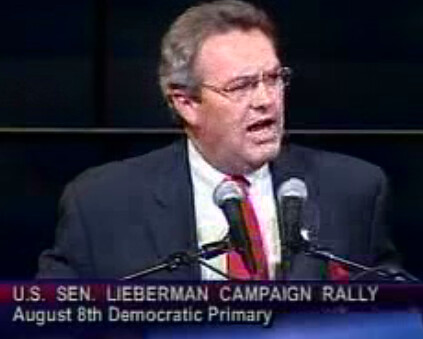Amann flashback and the 169 DTC strategy
 Ring, ring, CTBlogger calling here with your wake-up call.
Ring, ring, CTBlogger calling here with your wake-up call.
As a friendly reminder of the type of Liebercrat Democrat we have currently running the State House of Representatives, here's a little flashback video featuring the the man vowed to crush all his competition in 2008, House Speaker James Amann.
While you watch this video clip, never forget Amann's true feelings towards those "shrieking" Ned Lamont supporters who dared to challenge his man Joe Lieberman (BTW: this is the same person who threw the state Democratic Party under the bus by supporting Lieberman AFTER the primary. Oh, did I mention that Amann is currently the most powerful Democrat at the State Capitol?)
As long as we have politicians like Speaker Amann and people such as a certain person at State Central who obviously had no problem celebrating with the person who lied, smeared, and (with the assistance of Republican donations via the blessing of the White House) defeated the Democratic nominee for senate, meaningful change within the Democratic Party in Connecticut will never become a reality and the status quo will go back to business as usual.
This is where you can come in and make a difference.
If you want change, then please remember that change starts at the local level. In other words, it's critical that you learn more about your local Democratic Town Committees and GET INVOLVED.
Mattw has written two excellent diaries on this subject (here and here) and I strongly encourage everyone to give them a read. Here are some key points.
1) Know your local party!Sounds good huh?
Unlike in most states, the parties in each town actually get to appoint people to local commissions, so involvement in DTCs is a real bridge to local governing power. As a result, DTCs tend to be large organizations that provide a broad base of support for local officials, and are usually organized to allow one DTC member for every 30-200 registered Democrats in the town. However, there are layers in each DTC: policy , nominating, and steering committees, District Leaders/Ward Chairs, DTC officers, state delegates, appointments to town government, and oftentimes, elected representatives from the town who serve on or participate in DTC proceedings. (Branford Boy laid out a good discussion of a DTC structure in a long-ago post here.)
2) Identify progressives and mentors (and vacancies!)
Once a list is developed of the Democratic Town Committee and various associated people, identify people who are the existing progressive base in the local structure: DTCs have a certain conservative quality to them, such that a sudden or radical challenge to existing practices will normally meet with resistance by long-time participants. Identifying the established people who will shepherd in new faces and new ways of doing thing is an important part of bringing about change.
Support for Lamont (and by extension, progressive politics or the legitimate structure of the party's democratic processes) may or may not be a valid way of determining someone's attitude. Post-primary support for Lieberman, however, is probably a fair indicator of someone's innate hostility to change.
Also, identifying vacancies in the structure (either on DTCs or appointments) is a great way to make immediate progress, allowing enthusiastic volunteers to start participating on an official level immediately.
3) Form an official or unofficial caucus of Democratic Progressives
Keeping progressive DTC'ers, Lamont people, DFA members, MoveOn people, and other liberal activists in touch with one another - in town and across town boundaries - multiplies everyone's effectiveness. This could be a simple directory people opt into, or a more formal structure with meetings and shared resources.
4) Build a strategic local agenda
Now, every town is different, and there will be more or less resistance depending on many variables -- too many to list here (plus I don't know enough besides :) However, BranfordBoy recommended a "recruit two" strategy for progressive DTC members, and each town will have specific needs that those wishing to participate can fill.
For example, immediate recruitment would work best for single-district towns with current DTC vacancies, while rallying volunteers to participate in the 2007 local elections builds connections and credibility for those wishing to participate in a town without vacancies. Some towns are in need of people who take part in campaigns, or young people / students, or to do specific tasks: finding out exactly how much the DTC needs things done will determine how and where new people can participate. Whether you "recruit two" or build a road into the organization in some other way, set realistic and specific goals for how much and what kind of change your local DTC will accept.
5) Build a regional or statewide agenda
Having an established base in every town allows larger-scale programs, including:
- Coordinate policy recommendations - DTCs can issue resolutions asking State Representatives and State Senators to carry legislation for them, and a DTC-based progressive caucus could coordinate a joint effort to prod the Democrats in Hartford to carry legislation to the floor on our behalf, as well as cultivate local support from town officials or committees that would benefit from that legislation.
- Train and develop candidates for office, and cultivate a local base to make qualifying donations for publicly-financed campaigns
- Recommend candidates for RTMs, State Reps, etc during the nomination processes
- Support progressive DTC members at the bi-annual DTC elections
- Coordinate floor activities at party conventions and nominating caucuses
Most DTC are meeting during this time of the month so there's still plenty of time for you to get involved.
Stop bitching about the State Democrats and do something...remember, change starts one town at a time.















<< Home